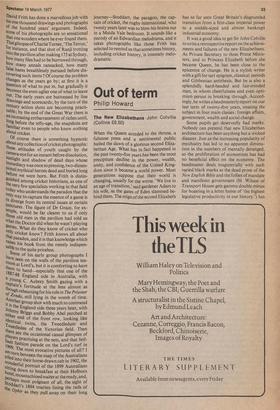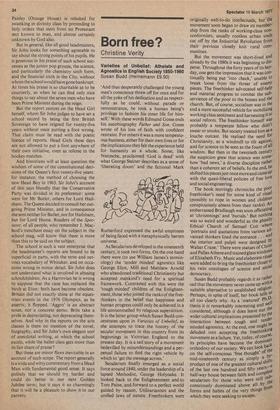Out of term
Philip Howard
The New Elizabethans John Colville (Collins £6.50) When the Queen acceded to the throne, a fulsome press and a sentimental public hailed the dawn of a glorious second Elizabethan Age. What has in fact happened in the past twenty-five years has been the most precipitate decline in the power, wealth, unity, and confidence of the United Kingdom since it became a world power. Most generations suppose that their world is changing, usually for the worse. 'We live in an age of transition,' said gardener Adam to his wife, as the gates of Eden slammed behind them. The reign of the second Elizabeth has so far seen 'Great Britain's disgruntled transition from a first-class imperial power to a middle-sized and almost bankrupt industrial economy.
It was a good idea to get Sir John Colville to write a retrospective report on the achievements and failures of the new Elizabethans. As Private Secretary to three Prime Ministers, and to Princess Elizabeth before she became Queen, he has been close to the epicentre of change. He is a stylish writer with a gift for tart epigram, classical periods and Gibbonian antithesis. But he is also a splendidly hard-headed and fair-minded man, in whom cheerfulness and even optimism persist in breaking through. Accordingly, he writes a headmasterly report on our last term of twenty-five years, treating the subject in four main classes: foreign affairs, government, wealth and social change.
Some pupils get deservedly bad marks. Nobody can pretend that new Elizabethan architecture has been anything but a wicked disaster. Just as the increasing popularity of psychiatry has led to no apparent diminution in the numbers of mentally deranged, so the proliferation of economists has had no beneficial effect on the economy. The headmaster deals magisterially with such varied black marks as the dead prose of the New English Bible and the follies of mandate and manifesto government (H. Wilson of Transport House gets gamma double minus for boasting in a letter home of 'the highest legislative productivity in our history.') Ian
Paisley (Orange House) is rebuked for swanking in divinity class by pretending to holy orders that stem from no Protestant sect known to man, and almost certainly unknown by God also.
But in general, like all good headmasters, Sir John looks for something agreeable to say about the strong points of his pupils. He is generous in his praise of such school successes as the junior pop groups, the science, and particularly the chemistry sixth form, and the financial sixth in the City, without whom the school would have gone bankrupt. At times his praise is so charitable as to be courtierly, as when he can find only nice things to say about the seven men who have been Prime Minister during the reign.
But the report centres on the Head Girl herself, whom Sir John judges to have set a school record by being the first British Sovereign to have reigned for twenty-five years without once putting a foot wrong. That claim must be read with the poetic licence of reports. Head Girls these days are not allowed to put a foot anywhere of their own initiative, even as referee in the hockey matches.
And historians will at least question the wisdom of some of the constitutional decisions of the Queen's first twenty-five years: for instance, the method of choosing the new Head Boy in 1963. Sir John's account of this says blandly that the Conservative Party was divided in its preference: some were for Mr Butler, others for Lord Hailsham. The Queen decided to consult her outgoing Prime Minister, and in consequence she sent neither for Butler, nor for Hailsham, but for Lord Home. Readers of the Spectator, of all people, who remember I. Macleod's trenchant essay on the subject in the school mag, will know that there is more than this to be said on the subject.
The school is such a vast enterprise that the headmaster's reports are bound to be superficial in parts, with the terse and nervous vocabulary of Whitaker, and on occasions wrong in minor detail. Sir John does not understand what is involved in abusing schoolchildren. As a Harrovian he is wrong to suppose that the cane has replaced the birch at Eton : both have become obsolete. Britain did not exactly shine at the equestrian events in the 1976 Olympics, as he asserts; it flopped. 'Aggro' is an abstract noun, not a concrete demo. Brits take a pride in depreciating, not deprecating themselves. And why in the reports on the at ts classes is there no mention of the novel, biography, and Sir John's own elegant sort of anecdotal writing, at which the school excels, while the ballet class gets more than its fair share of praise?
But these are minor flaws inevitable in an account of such scope. The report generally is a wide and witty commentary from a Head Man with fundamental good sense. It says politely that we should try harder and could do better in our next Golden Jubilee term; but it says it so charmingly that it will be a pleasure to show it to our parents.



































 Previous page
Previous page